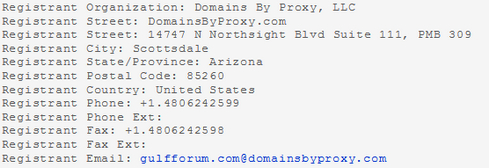Anytime you register a new domain name the registrar is required (by ICANN) to enter your contact information – name, physical address, email address, and phone number – into its WHOIS database. This database is a searchable directory that holds contact information for all of its domain registrants. This personal information is free of charge to any member of the public who wants to lookup a particular domain. To help fight unwanted solicitation and keep your personal information private, domain registrars offer whois privacy and proxy services to customers which can be used to hide your personal information and instead display the registrars own details. Some domain registrars (like DynaDot) offer this free with new registrations while others (like GoDaddy) still charge a yearly fee for it. So, what’s the difference between traditional whois privacy services and whois proxy? That’s what I’ll be covering in this blog post!
Whois Privacy usually refers to a service in which the owner of a domain name is listed in the public whois contact records, but the privacy service’s contact details (phone, name, address, and email) are listed instead of the owner’s. This makes the registrant the owner of the domain, but keeps them from getting unsolicited emails or phone calls and prevents them from having to disclose their personal mailing address.
Whois Proxy goes a step further by masking the identity of the registrant. The proxy service acts as a proxy registrant. Here’s an example of one particular domain using whois proxy:

It’s not uncommon for people to mistake whois proxy services as whois privacy. Over the years most registrars have actually transitioned from privacy over to proxy, and I have personally interchanged the two when talking about them in the past. As for the uses of whois privacy and proxy services, there are several different reasons businesses and individuals utilize this option. Privacy concerns is probably the most common among individuals. For businesses it’s often used when they want to keep new products or services secret before finishing a particular website for them. I’ve actually listed several different reasons why you should always use whois privacy or proxy services in my previous blog post Why Use WhoIs Privacy.
At one time domain investors preferred not to use whois privacy services because it would make the process of potential buyers easily contacting them harder and much more strenuous. However, with the growing number of spam emails, telephone scams and other annoying telemarketing calls taking place these days (and with the larger number of registrars and parking companies offering nice for sale landing pages), enabling and using whois proxy or privacy services should always be done. For anyone out there with blackhat or illegal methods running through their mind, it’s important to note that whois proxy and whois privacy services are certainly not foolproof. Domains By Proxy for example, will remove the proxy if your domain gets hit with a UDRP. That’s because it’s simply a proxy, and you will need to be able to properly defend the UDRP complaint.

